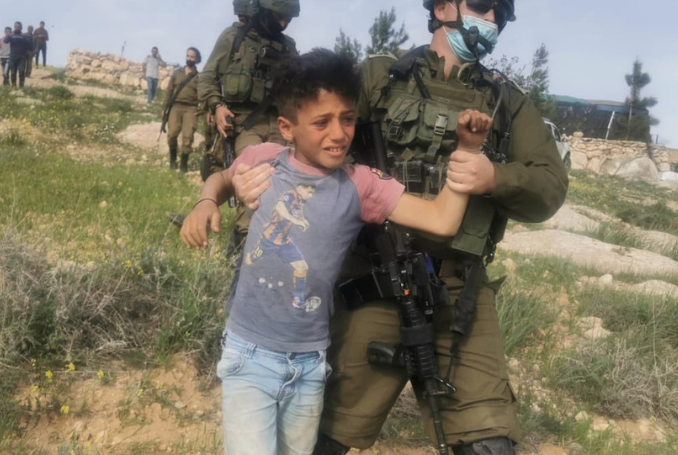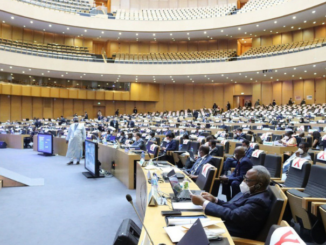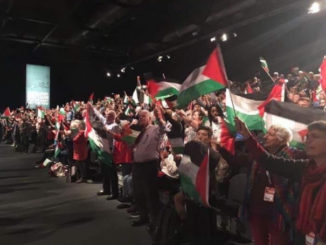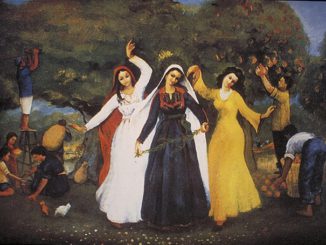
By Benay Blend
“Yes, I am thinking of Palestinian children and undocumented children as well,” mused Diné activist Melissa Tso. “They are literally being killed daily by these settler governments.” As “an essential part of [her] culture,” running helps to “process things,” and so she did the 2.15 run in memory of the 215 Indigenous children who were found in a mass grave at Kamloop residential school in Canada.
On May 29, 2021, Aljazeera reported that the remains of more than 200 Indigenous children, some as young as three, had been found at the site of a former residential school in the western province of British Columbia.
“To our knowledge, these missing children are undocumented deaths,” Tk’emlúps te Secwépemc First Nation chief Rosanne Casimir explained. They are among the many victims of mental and sexual abuse, neglect and other forms of violence over a period of 100 years during which church-supported boarding schools operated across Canada.
By forcibly taking children from their families, the schools sought to break Indigenous family and cultural ties in order to assimilate the children into white Canadian society. According to Maskwasis Boysis, co-founder of Bear Clan patrol—Calgary and Chairman of the Mimiw Sakihikan’Iyiniwak Social Justice Committee, approximately 6000 native children died in residential schools from disease, beatings, firing squads, malnutrition, and electrocution, among other forms of torture and neglect.
“The residential schools took the children from the land,” Boysis continues, “to disconnect people from their culture in order to take the land from the children.” Moreover, this form of genocide, he says, is ongoing, as children are still removed from their “ancestral lineages. One of the worst and most powerful things on this earth is the look in a mother’s eyes and the pain she experiences when she has that which she loves most in this world taken away from her.”
Because the violence is ongoing, so is the trauma, mental scars that are generational in nature in that they are passed down from parents to children in a never-ending cycle of pain. Nevertheless, “what happened to the children at Kamloops Residential School,” writes Adel Eskander (Assistant Professor of Global Communication at Simon Fraser University), “is neither unique nor surprising.” Like settler colonial projects everywhere, including the Americas and Palestine, its “objectives,” he continues, “were always a combination of land appropriation, resource extraction and demographic engineering.”
The abduction of Indigenous children, he concludes, was “a project meant to render their worlds unsalvageable, create new realities on the ground, demoralize them out of resistance.” Given this framework, it makes sense that Israel’s treatment of Palestinian children would be much the same.
Indeed, in the past few days, Israel has launched a massive arrest campaign against Palestinians who participated in recent uprisings against the state’s colonial project. As Abir Kopty notes, Israeli police officers, border police and secret service members are expected to arrest approximately 500 participants in peaceful protests.
Among those arrested have been children, including Abdul-Khaliq and Mohammed Burnat, sons of Bil’in activist Iyad Burnat. In an interview with Robert Inlakesh, Burnat chronicles the history of Israeli aggression that has for years been unleashed on his family. Earlier in May, Zionist forces murdered his nephew Islam, a 16-year-old boy who was participating in the protests. Since then, they have repeatedly invaded his house, along with other homes, wreaking havoc and arresting the children of other families.
“After they took Abdul-Khaliq and Mohammed, my wife and my daughter don’t sleep, the tears haven’t left my wife’s eyes,” said Iyad. “My youngest son Mohyaldeen,” he continues,
“is growing up seeing nothing but violence. He knows his eldest brother Majd was shot and almost died, his second-eldest brother Abdul-Khaliq was also shot many times and imprisoned when he was only 17-years-old for 13 months. He has seen nothing but violence and even though it’s normal for these things to happen now, he still gets scared, he’s just a little child.”
Abdul-Khaliq and Mohammed are now in al-Moskobiya prison, a detention facility in West Jerusalem that Inlakesh says has a reputation for using high level forms of torture during interrogations.
Indeed, Burnat reports that his lawyer, who communicated with Abdul-Khaliq via computer screen, attests that the boy says he is being placed in what is known as a “Ghost Chair” for more than 15 hours a day in order to extract information that he does not have. According to Burnat, the ghost chair is small, so that the hands and feet can be tightly tied to inflict a maximum amount of pain.
These two boys are among the many children now in Israeli jails. Palestinian journalist Zaina Halawani (recently arrested while covering protests in Sheikh Jarrah), documented her experience listening to Palestinian children screaming for their mothers during the few nights that she spent in prison.
In 1948, Prime Minister David Ben Gurion warned: “We must do everything to insure they (the Palestinians) never do return.” Indeed, he hoped that “the old will die and the young will forget,” ensuring that they would not return to their homes.
This is perhaps why the Israeli military targets children like Abdul-Khaliq and Mohammed. They want to begin breaking the resistance of the Palestinians when they are young in hopes that they will leave their land. It was also the rationale behind forcibly taking Indigenous children away from their family in order to send them to the now infamous boarding schools, thereby severing their connection with the land.
Fortunately for the Indigenous in the Americas and in Palestine, that strategy has failed. Today, June 5, 2021, marks the anniversary of the Naksa, the Six Day War in 1967, a time when Israel oversaw the displacement of more of its Palestinian population as well as the beginning of what is now known as the Occupation. To mark the occasion, demonstrations will take place here in Albuquerque, New Mexico as well as around the world, thereby underscoring the desire of Palestinians to maintain their connection to the land in the hopes of someday fulfilling their legal right to return.
On Indigenous lands in Minnesota, people are gathering to resist Line 3, a section of the Dakota Pipeline that is proposed to cut across Anishinaabe territory, land which surrounds the Great Lakes region and extends north toward Hudson Bay. This resistance demonstrates the spiritual relationship between Indigenous peoples and their land — a connection that Native people believe the pipeline will sever.
Given both these examples, it is clear that colonial efforts to ethnically clear the land has failed. As Melissa Tso concludes,
“It shouldn’t take the findings of our people’s remains to validate this horrible legacy of colonial governments (Canada & United States). Respect our humanity by respecting the truths in history, and by supporting our struggle for liberation. Stop treating us the same way our kids got mistreated in residential/boarding. Stand up for indigenous rights, always.”
The same should be said for Palestinian children, too.
– Benay Blend earned her doctorate in American Studies from the University of New Mexico. Her scholarly works include Douglas Vakoch and Sam Mickey, Eds. (2017), “’Neither Homeland Nor Exile are Words’: ‘Situated Knowledge’ in the Works of Palestinian and Native American Writers”. She contributed this article to The Palestine Chronicle.

– Benay Blend earned her doctorate in American Studies from the University of New Mexico. Her scholarly works include Douglas Vakoch and Sam Mickey, Eds. (2017), “’Neither Homeland Nor Exile are Words’: ‘Situated Knowledge’ in the Works of Palestinian and Native American Writers”. She contributed this article to The Palestine Chronicle.








